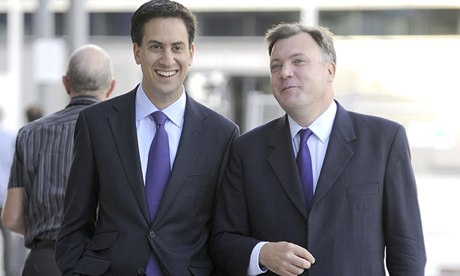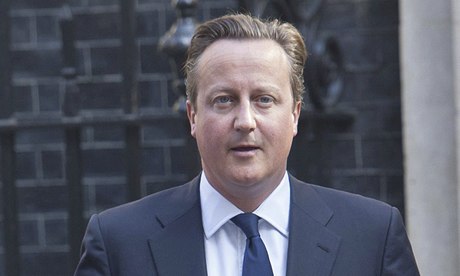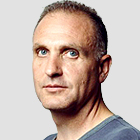Ed Miliband, Ed Balls and David Cameron all studied philosophy, politics and economics at Oxford. What does the degree really teach you and why is it the perfect springboard to a career in Westminster and the media?

Ed Miliband and Ed Balls. Photograph: Stephen Simpson/Rex Features
On their own, they aren't particularly remarkable. Taken together at York or Warwick, they still aren't anything very remarkable. But study philosophy, politics and economics(PPE) at Oxford University and you get power and influence thrown in with your degree certificate on graduation day.
At least that's the way it looks. Of the current cabinet, David Cameron, William Hague, Jeremy Hunt and Philip Hammond all read PPE: as did Ed Miliband, Ed Balls and Danny Alexander along with about another 30 MPs. Among many others at the BBC, Nick Robinson, Stephanie Flanders, Evan Davis and Newsnight editor Ian Katz read PPE. At least eight journalists at the Guardian read PPE, with similar numbers at the other broadsheets. And tabloids, for that matter. Toby Young read PPE. Even Chris Huhne read PPE.
Some might take one look at both politics and journalism and conclude that the one thing they have in common is a talent for having a firm opinion about absolutely everything regardless and that PPE is a life lesson lesson in winging it. Others who went to Oxford certainly think that. When asked by Jeremy Paxman on Newsnight if it rankled that Cameron had got a first when he had only got a 2:1, Boris Johnson, whose degree was in classics, said: "It would if it wasn't that his first was in PPE." His message was clear: PPE was an inferior degree. Though one might also wonder at the cheek of Boris Johnson for calling Cameron out as a slacker.
Slack is certainly not the word Oxford University chooses to describe PPE; only 15% of those who apply are admitted. Rather it prefers to market the course as "Modern Greats" that "brings together some of the most important approaches to understanding the social and human world around us, developing skills useful for a whole range of future careers and activities". In the first year, students study all three subjects equally, after which they can choose to drop one.
So what sort of student chooses PPE? For some it's a chance to try something new. "I had taken science A-levels but didn't want to continue any of those subjects at university," says one graduate. "PPE seemed like a safe transition. The three branches covered a lot of ground and if I found one boring or wasn't up to it, then I could drop it." Not knowing exactly what they wanted to study was also key for many other students but there are a significant number for whom the course's reputation was critical.
"There were those who had chosen PPE precisely because it was a springboard to a career in the politics or the media," says a former student. "They had their whole lives mapped out from the moment they arrived at Oxford. They knew they were going to edit the student newspaper, be president of the union and what job they were going to end up in. They probably even knew whom they were going to marry. They seemed to have got just about everything else right."
 David Cameron. Photograph: Rex
David Cameron. Photograph: Rex
"It's definitely something that is commented on and joked about," says a graduate from Wadham. "There's a moment in The West Wing, a flashback I think, when one character is handed a napkin with 'Bartlett for President' written on as they plan to make him run for office. Well, I'd be lying if I said there weren't more than a few drunken nights that ended with someone being handed a napkin with 'X for Prime Minister' written on. People are fully aware, and much of the student union is made up of PPE students. That creates a pressure in its own way too – I certainly still think about it. I think most people who did it are interested in politics, and so it's natural to wonder if you could do it better – especially as you see more and more of your peers getting heavily involved."
PPE's reputation for being a bit of a doss compared with other courses stems not so much from the amount of work that is required – most students remember feeling they could never hope to cover all the reading they were given – but from the freedom they have to do it. While science students usually had to be in the lab every day from 9am till 5pm, PPE students could spend the entire morning in bed. Lectures are not compulsory: one of the graduates who spoke to me said he never went to a single one during his entire three years – "There was no real point so long as you did the reading" – and the three or four tutorials a week are usually arranged at a mutually convenient civilised hour later in the day. So, as one graduate put it: "If you wanted to lie in during the mornings and plan your conquest of Oxford in the afternoons, you could. As long as you got your essays done on time – you could write them at night, if necessary – there was nothing stopping you."
Most graduates say there were many more men in their year than women, but no one found it particularly macho. "Yes, it was competitive and students were ambitious," says a female graduate. "But you'd expect that at Oxford; the university is full of alpha types who are used to succeeding. About a third of the students may have made a point of wanting to show how clever they were by not dropping a subject, even though it gave them a great deal more work and didn't get them any extra benefit, but the bragging rights weren't worth a great deal as most students didn't know each other. There were so many different options and tutorial groups were so small, you could go through your entire Oxford career never talking to some people on the course."
Oxford's sales pitch for PPE describes the course as "a multidisciplinary degree designed for those who like to draw connections among political, economic and social phenomena". This is slightly misleading, as it implies that the course tutors go out of their way to help students make these connections and that the three disciplines have been tailored to complement one another. "Nothing could be further from the truth," says one graduate. "Each subject exists entirely in its own bubble and it's almost as if a don would rather die than talk to someone teaching one of the other subjects. Every don is convinced that theirs is the only subject worth doing and that the others are a bit of a waste of time. So you're left to make your own connections between the subjects."
Sometimes this works better than others. One graduate regrets having given up economics at the end of the first year. "It was taught in such a dull, theoretical way that I just couldn't see the point of it," she says. "It just didn't seem to relate to anything in real life. Only since I've left Oxford have I come to understand how central it is to understanding how the world operates."
But mostly it works like this. Students make the political, philosophical and economic connections they were always going to make. Those on the right have their rightwing views reinforced; those on the left have their leftwing views reinforced. All that's happened in the three years in between is that everyone has become a bit better informed and a lot more confident that they are right. And maybe it's just as much the social connections that are made that turn so many PPE graduates into masters of the universe: after all, many continue to orbit one another throughout their careers. "The thing is this," one graduate laughs, "PPE is such a big subject that no one can ever know everything, so we all have to bullshit like mad at times to cover up our ignorance. And we by and large get away with it. So we carry on bullshitting once we leave Oxford and most of us are still getting away with it."
The syllabus
Year 1
All courses studied equally.
Philosophy – general philosophy, moral philosophy and elementary logic.
Politics – theorising the democratic state and analysis of democratic institutions in the US, UK, France and Germany.
Economics – microeconomics, macroeconomics and mathematical techniques.
Years 2 and 3
Only two branches must be taken.
Philosophy – ethics and either early modern philosophy; or knowledge and reality; or Plato's Republic; or Aristotle's Nicomachean Ethics.
Politics – any two of: comparative government; British politics and government since 1900; theory of politics; international politics; political sociology.
Economics – microeconomics, macroeconomics and quantitative economics
In addition to these compulsory courses, second- and third-year students may take optional papers from a choice of more than 50 courses. Compulsory courses can also be taken as options.

disposable mask help limit the spread of germs. When someone talks, coughs, or sneezes they may release tiny drops into the air that can infect others. If someone is ill a face masks can reduce the number of germs that the wearer releases and can protect other people from becoming sick. A face mask also protects the wearer’s nose and mouth from splashes or sprays of body fluids.
ReplyDelete